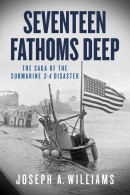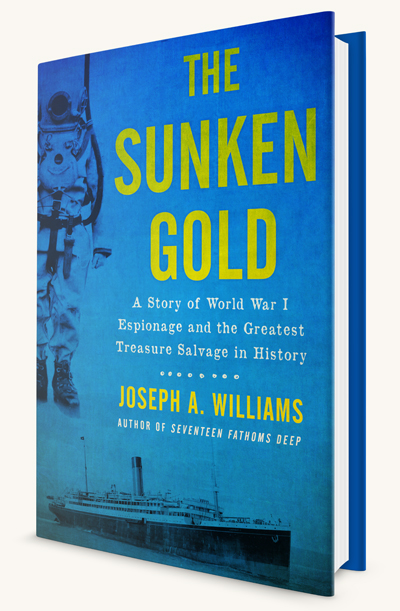 A fascinating look into one of the greatest treasure hunts in history, The Sunken Gold tells a story of daring espionage and adventurous diving. As World War I waged on, a desperate British Royal Navy knew that recovering the gold lost to the bottom of the ocean—collateral for the war effort to a still-neutral United States—was of the highest priority. A diver and military man, Guybon Damant was charged with leading a talented crew to hunt for the largest cache of sunken gold ever known. But the navy soon needed the highly skilled team to search for something worth far more than the 3,211 gold bars. Looking through sunken U-boats, the crew searched for secret documents that would aid the Allies in defeating German submarines.
A fascinating look into one of the greatest treasure hunts in history, The Sunken Gold tells a story of daring espionage and adventurous diving. As World War I waged on, a desperate British Royal Navy knew that recovering the gold lost to the bottom of the ocean—collateral for the war effort to a still-neutral United States—was of the highest priority. A diver and military man, Guybon Damant was charged with leading a talented crew to hunt for the largest cache of sunken gold ever known. But the navy soon needed the highly skilled team to search for something worth far more than the 3,211 gold bars. Looking through sunken U-boats, the crew searched for secret documents that would aid the Allies in defeating German submarines.
Author Joseph A. Williams took the time to chat with us about deep sea diving, treasure hunting and squeaky Mickey Mouse voices.
There are a lot of humorous moments in the book, such as when Damant kept one of his animal test subjects as a pet or when the crew managed to smuggle another treasure—rum—from the wreck. Were there any other chuckle-worthy moments that didn’t make it into the book?
When I write a story, I usually try to incorporate all humorous moments since it effectively humanizes the story. With The Sunken Gold I found that there were enough and more such moments to satisfy, especially when considering Damant’s dry wit. What I didn’t include were often Damant’s take on contemporary matters. Damant wrote his unpublished memoirs in the 1940s and ’50s and would often include editorial comments concerning fashions and the like that, when looking at them today, provide a sense that he had become a stodgy old man. Other moments include details or vignettes from Damant’s childhood that, while amusing, detracted from the story. For example, he compared the “half-naked ladies of today” (being mid-twentieth century) with those of his childhood. He was clearly a Victorian-era product.
If a reader was transported in time to the salvage ship, what do you think they would find to be most surprising?
The diver’s voices through the telephone system. Unless you are in the know about divers and diving, you may not know that compressed air has the effect of changing the sound of your voice so that it is squeaky—think of when one inhales helium. So the divers are doing all this gallant underwater work, but their voices on the telephone are coming out sounding like Mickey Mouse.
Both The Sunken Gold and your previous book, Seventeen Fathoms Deep , show your encyclopedic diving knowledge. How did you first become interested in diving? Do you have a favorite diving memory?
 I have always been interested in things underwater since I read Verne’s 20,000 Leagues Under the Sea for Mr. Schmidt in third grade. The experience of being underwater is tranquil and alien. My interest in historic diving really came about from my research on Seventeen Fathoms Deep. It made me greatly appreciate the technical difficulties associated with deep water diving, especially the fact that the divers were physically connected to the surface, which exponentially increased their peril. While I have never dived in a traditional diving dress such as a Mark V, it is on my bucket list.
I have always been interested in things underwater since I read Verne’s 20,000 Leagues Under the Sea for Mr. Schmidt in third grade. The experience of being underwater is tranquil and alien. My interest in historic diving really came about from my research on Seventeen Fathoms Deep. It made me greatly appreciate the technical difficulties associated with deep water diving, especially the fact that the divers were physically connected to the surface, which exponentially increased their peril. While I have never dived in a traditional diving dress such as a Mark V, it is on my bucket list.
[Ed note: Check out our interview with Joe about Seventeen Fathoms Deep here.]
Between the searches for gold and ciphers and attempts at ship salvages, several underwater missions were often delayed or cancelled by the British Royal Navy. Damant never seemed to get discouraged and carried on with determination. Would you say he was an eternal optimist or a dogged realist?
I think if Damant were to respond to this question he would say he was a realist: “Of course we would get the gold—it is just mere persistence.” However, to my mind Damant was an optimist who was grounded in his desire to come back and get that gold. At the end of the war, Damant really didn’t have many prospects as to what to do—and the half-completed mission of raising the Laurentic‘s gold ate at him. He maneuvered himself to get onto the mission and, even at the lowest ebbs in their fortune, would always color their work so that getting the treasure was merely a matter of time. He was, of course, proved right, but I think there was just an equal chance that he would have failed. He also, mind you, was looking out for the fortunes of his divers, who after the war needed employment as well.
There are still gold bars from the Laurentic’s treasure buried at the bottom of the Irish Sea. Could I go dive on the wreck now and look for gold?
You would need the permission of the Cossums, who are the wreck owners. They obtained the wreck in the late 1960s from the British government. This is not to say that many haven’t dived on the Laurentic illegally and taken artifacts (no gold)—which have aggravated the Cossums to no end.
Based on Damant’s years of dedicated excavation, do you think that it would be possible for today’s treasure hunters to find the gold?
Yes, it would. The problem would be cost. There are 20 bars of gold buried under countless tons of remaining wreckage. In order to get at the gold, you need to remove the wreckage, which would prove more costly than the gold is worth. The only caveat to this would be if a treasure hunter is lucky and manages to find the exact spot and if the gold is concentrated in one area. In any event, you’d also need to budget in a percentage to the Cossums (the wreck owners) as well as a percentage to the British government.
How are you so sure there is still gold in the wreck? Couldn’t somebody else have taken it? Could some of it have been stolen during the salvage?
The salvage efforts were very carefully monitored not just by Damant but by officials from the British Treasury. Each individual bar was recorded, weighed and tallied and then documents show receipt on the other side. It was also impossible for divers to steal the gold underwater because they were physically connected to the salvage ship and all their movements were known. Also, it is very difficult to try to unload a bar of gold. This is not to say that it couldn’t be done, but that the chances of it happening are very remote.
What happened to the gold after it was recovered?
It was melted, forged into new bars and recirculated.
Where did the gold come from?
It came from multiple sources and countries—France, Britain, the United States, Russia. This was just how gold would circulate throughout the world at that time. Each bar was stamped with its country of origin, fineness, etc. The divers who worked on the Laurentic quickly learned which bars of gold were of the finest quality (British) and the lowest (French and Russian)
What was the most difficult part about writing this book?
I think in my case, as it has been with all my books, it’s coming up with a final title. I like my chapter titles and have never had one changed, but I tend to be a little too abstract with my original title suggestions. I think we finally settled on The Sunken Gold as being a clear indicator of what the book is about.
What was your favorite part of writing this book? What do you hope readers take away from The Sunken Gold?
My favorite part was the research. I get most excited when I discover a source that has never been tapped before. In this case I was fortunate to make acquaintance with the relatives of G. C. C. Damant who were able to locate his lost memoir. No where else has this source been used, which ultimately allowed me to get into my primary character’s head and see events from his perspective.
I hope that when readers finish the book they take away an ingot or two from the wreck (save one for me). Just kidding (sort of) about that—but I also think that today’s world is very cynical regarding people’s motives. Ultimately, Damant conducted his missions for patriotic reasons and common good above all else. He wasn’t interested in the gold for his own glory or profit, but for the good of his country. There needs to be a bit more of that out there.

“Joseph A. Williams has uncovered one of the greatest stories of World War I, a tale of U-boats, lost treasure, and the tenacious diver determined to recover it at all costs. Simply put, this book is a real gem.” —James M. Scott, 2016 Pulitzer Prize finalist for Target Tokyo: Jimmy Doolittle and the Raid That Avenged Pearl Harbor
“A wild and wooly tale of pressurized goats, black arts, and maritime gold, all beautifully told. Williams has a real gift for fleshing out the human story from arcane historical facts. I was taken by the whole thing, and devoured the whole of it in two thrill-filled nights.” —James Nestor, author of Deep: Freediving, Renegade Science, and What the Ocean Tells Us About Ourselves
“A fascinating, meticulously researched, historical adventure of gold salvaged under impending doom of War and Wind.” —Bernie Chowdhury, author of The Last Dive
“A well-told tale of naval exploits in which gold is the MacGuffin.” —Kirkus Reviews
The Sunken Gold hit the shelves September 1, and is available wherever books and e-books are sold.
[Order it now $27] [Request a review copy]
No Comments
No comments yet.